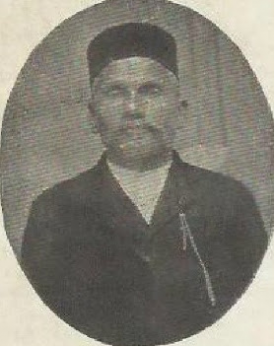Suleman Walji - Kilwa
Contents
Birth & Death
Haji Suleman Walji - Kilwa - Born in Jamwali, Jamnagar, India moved to Kilwa in 1900 and lived in Kilwa, Dar es Salaam, Kigoma and Albertville (Kalemie), Congo. He died in Albertville (Kalemie) in Congo in 1930
The following information was provided by Br Rajabali Mohamedali Suleman in 1960:
Kilwana Sawaal Jawaab
My grandfather Marhum Haji Suleman Walji was originally from Jamwadi, Jamnagar, India. He arrived in Kilwa around 1900 from India. My father Mohamedali Suleman was born in Kilwa in 1901. At Kilwa, my grandfather converted from Ismail to Ithnaasheri. He, together with some colleagues, held a question-answer session with His Highness the Aga Khan III and a book was published with the title “Questions and Answers at Kilwa.” (This incident happened in Kilwa in 1905 in a ship off Kilwa harbour. His colleagues were Nurmohamed Sheriff Manekia and Suleman Bhimji)
Albertsville
For the last two decades of his life, Mulla Asgher lived in London, England. However, during his youth, he was active in a number of social activities including school debates where he often led his team in inter-school debating competitions. In addition, he showed great interest in the educational welfare of students as he devoted his free time to coaching classes for primary and secondary students.
Campaigns run by Mulla Saheb
In 1963, Mulla played a pivotal role in launching an aid campaign (Zanzibar Relief Fund) to provide assistance to the victims of the aftermath of the Zanzibar Revolution. He witnessed firsthand this uprising and was personally involved in assessing the plight of the people. Crisis for the Community were apparently not few and far between. After Zanzibar, there were problems in Zaire, Rwanda, Burundi, and Madagascar - culminating in the mass exodus of Asians from Uganda in 1972. All in all, the Africa Federation played a vital and often silent role. Throughout, Mulla Asgher, in his capacity, either as Hon. Secretary, Vice President or as the President of the Africa Federation, was at the helm of such endeavors.
His Leadership Skills
During the period from the 1980’s and beyond, when Islam within the UK and elsewhere in Europe was often depicted as adversarial and threatening, Mulla Saheb was able to present Islam to Muslims and non-Muslims alike, in a manner that brought understanding and accommodation between people of different faiths. History will judge this profound role, of spreading the message of the Ahlulbait (a.s), as a force of good at a time of major uncertainty due to the distressing displacements of our own community from Uganda. This displaced and deprived community settled in Europe and North America; an event that may prove to be of benefit in the Islamic religious awakening in the West.
The displaced Khoja Shia Ithna Asheries from Uganda arrived in the UK in 1972 carrying very little with them. They had to leave behind much of what they had owned. They were soon facing new challenges in their new environment. It was here that Marhum Mullasaheb’s presence in Europe provided the necessary guidance and direction to progress. Imambadas, masjids and madressas needed to be established at a rapid pace in order to prevent unIslamic influences to creep within and divert our vulnerable community members. Work to this end began and soon centres at Peterborough, Birmingham, Leicester and 9 London (Hammersmith) were acquired which functioned as Imambaras. That was just the beginning.
Marhum Mullasaheb’s leadership did not limit itself to the Khoja Shia Ithna Asheri community in its services. Many Shia Ithna Asheries from India, Pakistan, Lebanon, Iran and Iraq settled in the UK, found themselves faced with similar problems as our own community. Through the WF, he helped many such communities to set up centres that have become the nucleus of their own community. Many centres now exist in London, the Midlands, Lancashire, Yorkshire, Edinborough and Glasgow.
He did not stop just at Shias. He was instrumental in advocating co-operation with all Muslims. Under his leadership, the WF has become a national member of the Muslim Council of Britain and is playing its role in dealing with problems and injustices faced by all Muslims. And, he did not draw the line at Muslims either. He became involved with Interfaith, a group that has representatives from all major faith groups in the UK. Today, because of his timely guidance, the WF is recognised as a key Muslim organisation in the UK.
Under his leadership, the WF assisted in setting up numerous Islamic centres. It is not bold to say that his leadership has gone some way in keeping our own community united and has helped us pave the way for establishing links with other Shia communities. For, the WF has become involved and has co-operated with other Muslim organisations and it has affiliated with groups that represent all types of religion to explain the message of the Ahlulbait (a.s) He became a beacon amongst many in the West for rekindling the Islamic faith from within the Muslims, consolidating and then entrenching a spiritual foundation based on the teaching and direction given to us by the Holy prophet (s.a.w). As a result, one observes the presence of an Islamic identity having the soul of Islam within it. This was his legacy to the Muslim community in the West.
Courses
Following the horrid experience of 4 months of his confinement in Iraq along with his wife, Mulla applied himself to bring up a new breed of Western educated religious instructors to impart religious education to our children. His sermons in English preceding the Urdu talks and the various lectures in English and Gujarati speak for themselves. He also conducted various refresher courses for potential Madrasah teachers
Narrative by Hassan A.M. Jaffer & Sibtain Panjwani
Reference:
E-Book of 12 Personalities
The World Federation of KSIMC
SENIORS ADVISORY BOARD
February 2006 / Muharram 1427
